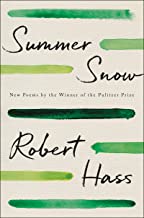Summer Snow: New Poems by Robert Hass 2020
Hass is a Pulitzer Prize and National Book Award winning poet and a former poet laureate of the U.S. as well as a professor at Berkeley, so this volume of poems, his first in 10 years, has been welcomed with great excitement.
I loved it, immediately beginning to re-read it upon completing it the first time. Hass worships nature, abhors war, violence, and environmental destruction and uses his pen to address those issues. My favorites are his poems about his beloved Sierras, as in these stanzas appropriately enough from ‘Stanzas for a Sierra Morning’: “You couldn’t have bought the sky’s blue./Not in the silk markets of Samarkind. Not/In any market between Xi’an and Venice./Which doesn’t mean that it doesn’t exist./Isn’t that, after all, what a stanza is for,/So that after a night of listening, unwillingly,/To yourself think, you can walk, idly,/Through some morning market, sipping tea,/An eye out for that scrap of immaculate azure.”
Or in his poem entitled ‘Patches of Snow’ in July where he writes in this prose poem introduction to a group of ten poems about death: “Coming into the valley, something about the way the grasses and wildflowers and trees climbed the mountains right up to the treeline, as if they were a young orchestra hitting high notes, and the way the white patches of snow in the saddles of bare rock between the massive peaks glittered in the sun undid me. If that’s the right word. Undid. Woke up. Life in its exuberance rushing straight uphill toward death. The night before I had been reading from an anthology of seventeenth-century English poetry.
Perhaps it was his poem about ‘Abbott’s Lagoon’, a pond which we drove by only last month on our way to Point Reyes on the Pacific Coast, or perhaps it was his poem entitled ‘Dream in the Summer of my Seventy-third Year’, but whatever it was, I loved this book and recommend it for its beauty of language, its embrace of a peaceful world of natural beauty, and for its erudition (it’s filled with literary references from the Aeneid to Dylan Thomas). As Hass writes in his poem ‘Nature Notes’, “A poet’s task is to find the words”. He has done so and done it with great skill, compassion, and wisdom. Read this book.



